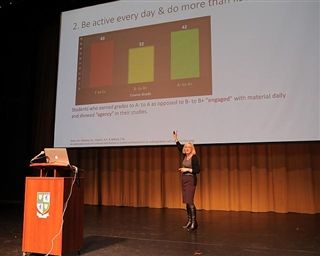The Senior School Career Expo not only provided students with the opportunity to learn about specific types of jobs or careers, but it also gave them access to lots of great advice on how to be successful at and in life after university. One of the clear messages that we reinforced throughout the afternoon was that education and career pathways often evolve and change over time. Exposing students to stories about career journeys helps them to develop awareness about what is fulfilling about different careers, what a day-in-the-life might be like, and that every opportunity can help them develop transferable skills. Each year, GNS is proud to claim that our graduating students get accepted into one, if not all, of their top three post-secondary choices. Part of the job of our University Advisors is to help our students make good choices about where to apply based on their interests, the courses and programs available, the location and costs of various schools, the lifestyle offered, and of course the individual career dreams and aspirations of each of our students. Part of our job as a school, however, is to also equip our students with the knowledge and skills that will help them be successful once they get to university—and beyond. To help fulfill this promise, our University Advisors organized a Career Expo for students in Grades 9 to 12. Beginning with a keynote delivered by Dr. Lisa Surridge, Associate Dean of Humanities at the the University of Victoria, the afternoon included breakout sessions with speakers from a variety of professions, many of which were current or past parents, or alumni of the school. Dr. Surridge shared data on retention studies universities are conducting on what can help their institutions predict who will stay and succeed following admission. The top factors were and Dr. Surridge’s takeaways were:
- Academic skills: Not the same as GPA so more than memorized facts. Learn to understand and master. Learn how to say “I don’t understand” and ask for help.
- Academic self-confidence: The capacity to take on academic challenges. Know how to study and tackle assignments. Learn to manage your time without parental help.
- Clarity of academic goals: Think about what you care about and determine your own goals. Don’t be afraid to make changes as you learn more about yourself and what you really want.
- Commitment/link to the university: Seek a fit between your university, your goals and your character. Invest time in your choices and visit campuses if you can.
- Social support: Seek support and ask for help. Surround yourself with people you can go to when you need them.
She then went on to offer some great advice on what kinds of behaviours and habits that should also help them find success:
- Go to class.
- Be active every day and do more than listen.
- Turn off devices.
- Plan your time.
- Talk to your teachers / professors.
After the keynote, students spent the rest of the afternoon attending small group sessions where speakers from a variety of careers talked about their jobs, their education, their university experience, and gave lots of great advice about how to find success and happiness in the future.Thank you to all the speakers for sharing your experiences with our students. It was an incredibly valuable afternoon.





